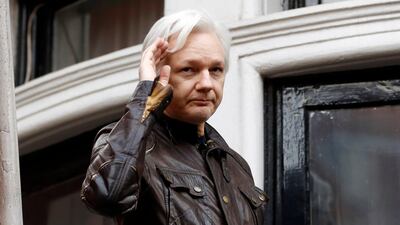Ecuador's government is cutting off WikiLeaks founder Julian Assange's communications outside the nation's London embassy.
Officials announced Wednesday they were taking the measure in response to Mr Assange's recent activity on social media.
As part of an agreement between Mr Assange and the Ecuadorean government, he is not permitted to send any messages that could interfere with the South American nation's relations with other countries.
Mr Assange has been living in Ecuador's embassy for more than five years.
Ecuador gave Mr Assange asylum after he sought refuge in the embassy to avoid extradition to Sweden for investigation of sex-related claims. Sweden dropped the case, but Mr Assange remains subject to arrest in Britain for jumping bail.
The decision from the Ecuadorean government came after Mr Assange on Monday used Twitter to challenge Britain's accusation that Russia was responsible for the March 4 nerve agent poisoning of a Russian former double agent in the English city of Salisbury.
He also questioned the decision by Britain and more than 20 countries to retaliate against the poisoning by expelling Russian diplomats deemed spies.
_______________
Read more:
Assange's arrest warrant upheld by UK judge
Ecuador president calls Julian Assange a 'problem'
_______________
The comments prompted a British Foreign Office minister, Alan Duncan, to brand Mr Assange a "miserable little worm" who should leave the embassy to turn himself over to British authorities.
Mr Assange, 46, has spent much of his time in his small room in the embassy tweeting and at times contributing to RT, a Russian state-owned television channel that broadcasts Kremlin messaging, as well as taking part in media conferences via video link.
In 2016, Ecuador briefly suspended his internet connection for posting documents online that were seen as having an impact on the US presidential election from which Donald Trump emerged the victor.
In May 2017, Ecuadorian President Lenin Moreno asked Mr Assange to refrain from commenting on a separatist crisis in Spain over that country's Catalonia region, after he tweeted that Madrid was guilty of "repression".

